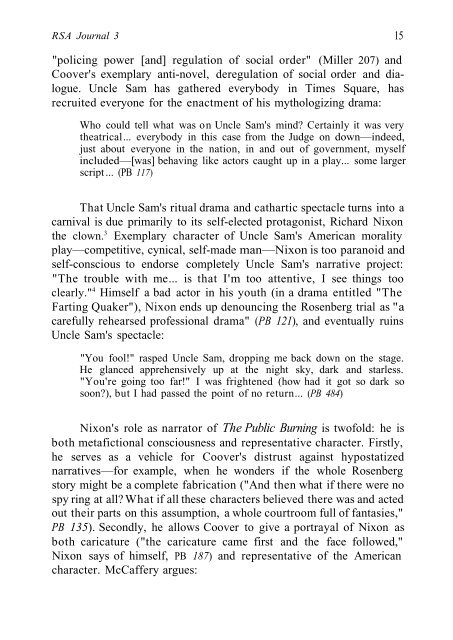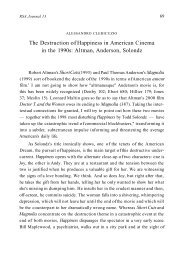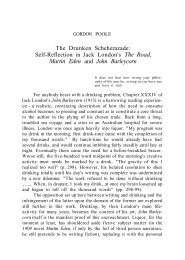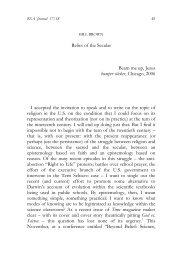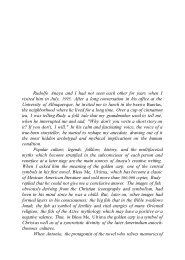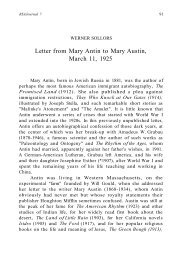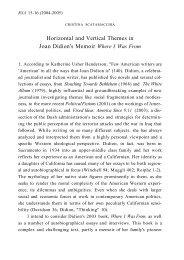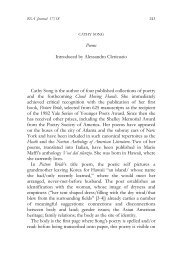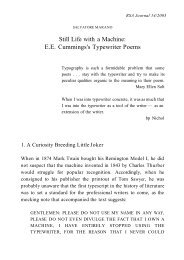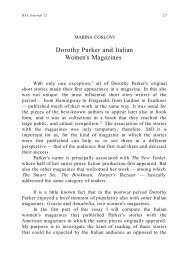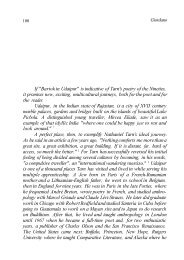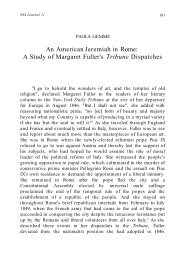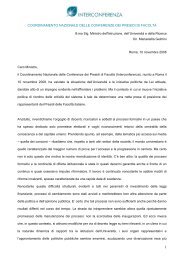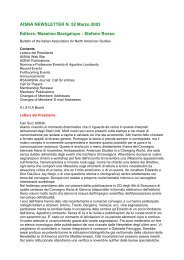Myth and Carnival in Robert Coover's The Public Burning - aisna
Myth and Carnival in Robert Coover's The Public Burning - aisna
Myth and Carnival in Robert Coover's The Public Burning - aisna
- No tags were found...
Create successful ePaper yourself
Turn your PDF publications into a flip-book with our unique Google optimized e-Paper software.
RSA Journal 315"polic<strong>in</strong>g power [<strong>and</strong>] regulation of social order" (Miller 207) <strong>and</strong><strong>Coover's</strong> exemplary anti-novel, deregulation of social order <strong>and</strong> dialogue.Uncle Sam has gathered everybody <strong>in</strong> Times Square, hasrecruited everyone for the enactment of his mythologiz<strong>in</strong>g drama:Who could tell what was on Uncle Sam's m<strong>in</strong>d? Certa<strong>in</strong>ly it was verytheatrical... everybody <strong>in</strong> this case from the Judge on down—<strong>in</strong>deed,just about everyone <strong>in</strong> the nation, <strong>in</strong> <strong>and</strong> out of government, myself<strong>in</strong>cluded—[was] behav<strong>in</strong>g like actors caught up <strong>in</strong> a play... some largerscript ... (PB 117)That Uncle Sam's ritual drama <strong>and</strong> cathartic spectacle turns <strong>in</strong>to acarnival is due primarily to its self-elected protagonist, Richard Nixonthe clown. 3 Exemplary character of Uncle Sam's American moralityplay—competitive, cynical, self-made man—Nixon is too paranoid <strong>and</strong>self-conscious to endorse completely Uncle Sam's narrative project:"<strong>The</strong> trouble with me... is that I'm too attentive, I see th<strong>in</strong>gs tooclearly." 4 Himself a bad actor <strong>in</strong> his youth (<strong>in</strong> a drama entitled "<strong>The</strong>Fart<strong>in</strong>g Quaker"), Nixon ends up denounc<strong>in</strong>g the Rosenberg trial as "acarefully rehearsed professional drama" (PB 121), <strong>and</strong> eventually ru<strong>in</strong>sUncle Sam's spectacle:"You fool!" rasped Uncle Sam, dropp<strong>in</strong>g me back down on the stage.He glanced apprehensively up at the night sky, dark <strong>and</strong> starless."You're go<strong>in</strong>g too far!" I was frightened (how had it got so dark sosoon?), but I had passed the po<strong>in</strong>t of no return... (PB 484)Nixon's role as narrator of <strong>The</strong> <strong>Public</strong> Burn<strong>in</strong>g is twofold: he isboth metafictional consciousness <strong>and</strong> representative character. Firstly,he serves as a vehicle for <strong>Coover's</strong> distrust aga<strong>in</strong>st hypostatizednarratives—for example, when he wonders if the whole Rosenbergstory might be a complete fabrication ("And then what if there were nospy r<strong>in</strong>g at all? What if all these characters believed there was <strong>and</strong> actedout their parts on this assumption, a whole courtroom full of fantasies,"PB 135). Secondly, he allows Coover to give a portrayal of Nixon asboth caricature ("the caricature came first <strong>and</strong> the face followed,"Nixon says of himself, PB 187) <strong>and</strong> representative of the Americancharacter. McCaffery argues:


